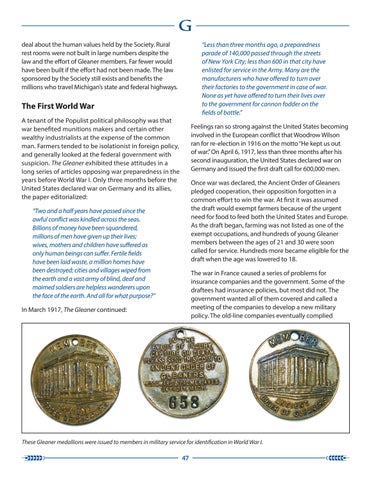deal about the human values held by the Society. Rural rest rooms were not built in large numbers despite the law and the effort of Gleaner members. Far fewer would have been built if the effort had not been made. The law sponsored by the Society still exists and benefits the millions who travel Michigan’s state and federal highways.
“Less than three months ago, a preparedness parade of 140,000 passed through the streets of New York City; less than 600 in that city have enlisted for service in the Army. Many are the manufacturers who have offered to turn over their factories to the government in case of war. None as yet have offered to turn their lives over to the government for cannon fodder on the fields of battle.”
The First World War A tenant of the Populist political philosophy was that war benefited munitions makers and certain other wealthy industrialists at the expense of the common man. Farmers tended to be isolationist in foreign policy, and generally looked at the federal government with suspicion. The Gleaner exhibited these attitudes in a long series of articles opposing war preparedness in the years before World War I. Only three months before the United States declared war on Germany and its allies, the paper editorialized:
Feelings ran so strong against the United States becoming involved in the European conflict that Woodrow Wilson ran for re-election in 1916 on the motto “He kept us out of war.” On April 6, 1917, less than three months after his second inauguration, the United States declared war on Germany and issued the first draft call for 600,000 men. Once war was declared, the Ancient Order of Gleaners pledged cooperation, their opposition forgotten in a common effort to win the war. At first it was assumed the draft would exempt farmers because of the urgent need for food to feed both the United States and Europe. As the draft began, farming was not listed as one of the exempt occupations, and hundreds of young Gleaner members between the ages of 21 and 30 were soon called for service. Hundreds more became eligible for the draft when the age was lowered to 18.
“Two and a half years have passed since the awful conflict was kindled across the seas. Billions of money have been squandered, millions of men have given up their lives; wives, mothers and children have suffered as only human beings can suffer. Fertile fields have been laid waste, a million homes have been destroyed; cities and villages wiped from the earth and a vast army of blind, deaf and maimed soldiers are helpless wanderers upon the face of the earth. And all for what purpose?”
The war in France caused a series of problems for insurance companies and the government. Some of the draftees had insurance policies, but most did not. The government wanted all of them covered and called a meeting of the companies to develop a new military policy. The old-line companies eventually complied
In March 1917, The Gleaner continued:
These Gleaner medallions were issued to members in military service for identification in World War I. 47




















